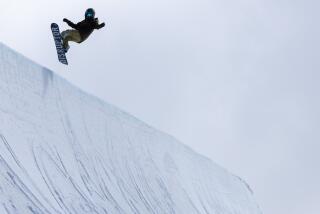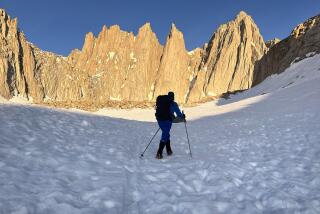SKIING / CHRIS DUFRESNE : World Cup Downhill Fiasco Was Sitzmark Against the FIS
No wonder skiers call the World Cup tour the “White Circus.”
Talk about your three-ring circuits.
Presented last weekend with a golden opportunity to showcase a media-starved sport and crown a new American hero, Alpine skiing took another public relations header, on national cable, on home soil.
America’s Downhill at Aspen last Saturday will be remembered as a disgrace, a day when the International Ski Federation (FIS) made the World Wrestling Federation look like the House of Lords.
Credibility is the foundation on which organizations succeed or fail, and right now the FIS is looking at a credibility gap the size of Cumberland.
This isn’t about whether “our” AJ Kitt was robbed of a World Cup downhill victory when officials decided to cancel the race after 16 runs because of a rut on the course.
The argument can be debated. When Norway’s Kjetil Andre Aamodt, maybe the best skier in the world today, says the downhill should have canceled, it deserves consideration.
No, this is about the handling of the event by the FIS, the sport’s governing body. This is about confusion, incessant delays, the suspicion of undo influence and major inconsistencies in company policy.
Kitt argues the point: When is a downhill course unsafe?
Only when it’s in America?
In 1989, Brian Stemmle of Canada was involved in a horrific crash at Kitzbuhel, Austria. He had to be air-lifted out in a helicopter.
But the race continued.
In 1991, Austrian Gernot Reinstadler was killed in a downhill crash at Wegen, Sweden.
But the race continued.
Saturday, Patrick Ortlieb of Austria tweaked his knee in a rut at Aspen, completed his run and the race was canceled.
Americans call that a double standard.
“A standard was set that was far higher than any set in Europe,” said Howard Peterson, president of U.S. Skiing. “They simply want to make an example of us because they think they can get away with it here.”
One theory holds that the Aspen cancellation was a make-up call by FIS safety directors for previous errors in judgment. In Colorado, the decision could be made quietly, far from the shadow of FIS scrutiny in Europe.
A week before at Whistler, British Columbia, four downhillers were seriously injured.
Maybe FIS jurors took some heat for allowing that race to continue and became too quick to stop the Aspen race.
Who knows?
Two FIS men, Karl Frehsner and Sepp Messner, deserve the discredit.
Several top racers--not just Americans--publicly called them incompetent. By Saturday’s end, some in the media had dubbed the two “Hans and Franz.”
There was dark comedy at every downhill turn.
You learned that a four-man jury voted unanimously to cancel the Aspen downhill.
A four-man jury? What happens in a 2-2 tie?
You learned it didn’t matter, that one man, Frehsner, held dictatorial power.
This must be the “Saddam Hussein clause” in the FIS Constitution.
If three jurors vote to race but Captain Karl says no, well, pack up your skis.
Frehsner might have redeemed himself until he declared he did not know who was leading the downhill when it was canceled.
Loud speakers, planted all over town, were blaring race updates at rock-concert decibels. You didn’t need to speak English to understand “Kitt! Kitt! Kitt!”
Frehsner is Austrian.
Ortlieb, the skier who tweaked his knee, is Austrian.
Is it too cynical to draw conclusions?
You learned that another FIS official, Messner of Italy, changed the downhill course that week without consultation. In his efforts to slow the racers, Messner installed an extra gate, causing skiers to slam on the breaks as they headed into a section of the course.
What Messner caused was a rut, then a ruckus.
Earlier in the week, Kitt confronted Messner and Frehsner on the street about the course change.
Kitt said his pleas were ignored.
He said racers will not be ignored forever.
He said downhillers want more of a say in course design and safety.
“I hope it never happens,” Kitt said, “but if racers get together and say we’re not going to race until we get our way, the FIS is dead in the water.”
Consider it a threat.
There were other unanswered questions:
One, if the course was so dangerous for Ortlieb, why was Kitt allowed to ski after him in the 15th spot?
Also, why should Kitt be penalized for doing his homework?
Kitt knew about the rut. After his run, Tommy Moe radioed up to him from the finish and told his teammate to change his line. Kitt did, avoided the rut and turned in the fastest time.
In sport, they call it strategy.
At the FIS, they call a three-hour meeting.
The shame is that the controversy drove many potential skiing fans away from the finish area and their televisions, possibly for good.
In America, there aren’t enough fans of the sport to lose even one.
Downhill racing really is an exhilarating sport, propelled by some of the world’s most splendid and daring athletes. But right now, the World Cup is a Ferrari powered by a Go-Kart engine.
Peterson, of the U.S. Ski team, has fought long and hard for reforms to make the FIS more professional and accountable.
He started fighting long before Americans were cracking the top-10 in downhill.
If something isn’t done soon, it won’t matter.
No one will care.
Then, no one will come. Kitt can barely see the future of competitive alpine skiing.
“I don’t think anyone would want to come back and go through this again,” he said of the Aspen fiasco. “I sure don’t want to experience something like this again. It’s not fun. It’s bad for the sport. It makes us look bad. I feel bad for the sport of skiing. I feel bad for the sponsors and I feel bad for everyone who’s a fan of ski racing.”
More to Read
Go beyond the scoreboard
Get the latest on L.A.'s teams in the daily Sports Report newsletter.
You may occasionally receive promotional content from the Los Angeles Times.







